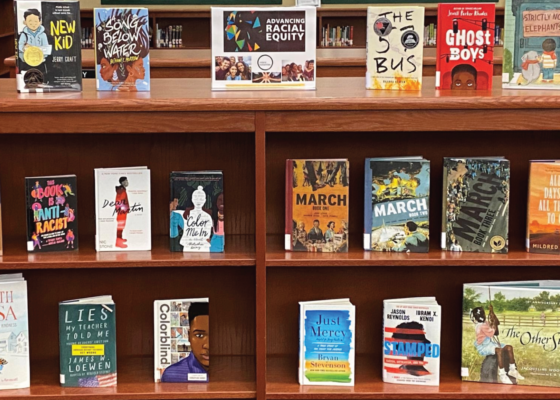A Book Walks Into a Bar…
June 30, 2020Indiana Humanities has a long history of bringing people together through community engagement, and Books, Booze & Brains, our monthly book club for the scientifically curious, is no exception. But as Krista Hoffmann-Longtin, with a PhD in…
Indiana Humanities has a long history of bringing people together through community engagement, and Books, Booze & Brains, our monthly book club for the scientifically curious, is no exception. But as Krista Hoffmann-Longtin, with a PhD in Education Leadership and Policy Studies from Indiana University, and Kelsey Binion, working towards a PhD in Health Communication from Indiana University-Purdue University Indianapolis, show in a new study, BBB is more than just fun. Though the setting is informal, the learning is very real.
Launched during our Quantum Leap theme in partnership with Central Indiana Science Outreach and March for Science Indianapolis, BBB has met monthly since August 2017 to discuss a science book, with a moderator and a guest scientist with relevant expertise in the topic of the book. In their preliminary findings, Hoffmann-Longtin and Binion argue that there is a need for increased access to scientific information, particularly to ordinary citizens. While prior research has shown that live science events successfully create emotional connections, the book club offers a unique experience that is necessary for science literacy.
By surveying the participants at the end of each book club meeting, Hoffmann-Longtin and Binion analyzed the attractiveness of the book club environment for its attendees and how their perceptions might have changed due to their participation (Hoffmann-Longtin & Binion 2020).
Hoffmann-Longtin and Binion’s preliminary results show that BBB effectively takes science to those outside of a formal classroom setting, reaching beyond the one-way transmission of science material. Citing the Fogg-Rodgers et. al study, conversations between scientists and the audience in a face-to-face format is where adults mainly comprehend scientific concepts. That is why Hoffmann-Longtin and Binion extended their research to include book clubs as an environment that fosters interpersonal connections (Hoffmann-Longtin & Binion 2020). The study also drew conclusions about who attends and why, and what aspects of the program were most effective.
For instance, the researchers found that while there is strong representation of the science and technology industries, the event is approachable to those with various backgrounds and interests. Many participants had few formal scientific connections and came from work settings in education, nonprofits, politics, business and more. Furthermore, it was reported that 44% of participants invited 1-2 new individuals to the book club, reinforcing its power in building a community (Hoffmann-Longtin & Binion 2020).
What participants do seem to have in common is their desire to hear from scientists and take part in conversation. The study found that 51% of participants assumed a role in the conversation, either as a responder or leader. Interestingly, in addition to learning about science, attendees also reported that they wanted to feel like they were supporting science in their home community (Hoffmann-Longtin & Binion 2020). The researchers posit that continuing programs like these will work to promote a lifelong interest in scientific information.
Want to get in on the action? We just posted the schedule for the next season of Books, Booze & Brains, which kicks off on Tuesday, July 28; see the full schedule of books and guest expert scientists here. Whether you’re a regular or not, consider joining us for a thought-provoking discussion. Hope to see you there!
This post was written by Katie Noble, a summer communications intern at Indiana Humanities and a senior at DePauw University.


